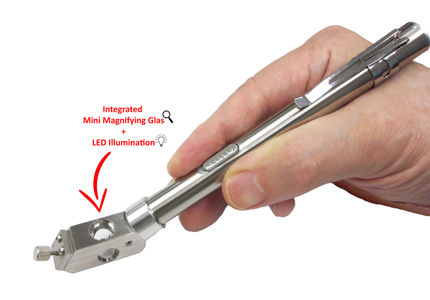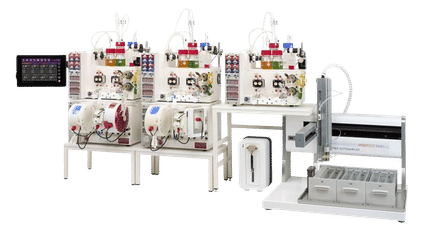To use all functions of this page, please activate cookies in your browser.
my.chemeurope.com
With an accout for my.chemeurope.com you can always see everything at a glance – and you can configure your own website and individual newsletter.
- My watch list
- My saved searches
- My saved topics
- My newsletter
Cargill
Cargill, Incorporated is a privately held, multinational corporation, and is based in the state of Minnesota in the United States. It was founded in 1865, and has grown into the world's second largest privately held corporation (in terms of revenue).[1] Were it a publicly held company, it would rank in the top 20 companies in the Fortune 500. Cargill's business activities include purchasing, processing, and distributing grain and other agricultural commodities, and the manufacture and sale of livestock feed and ingredients for processed foods and pharmaceuticals. It also operates a large financial services arm, which manages financial risks in the commodity markets for the company. In 2003 it split out a portion of its financial operations into a hedge fund called Black River Asset Management, with about $10 billion of assets and liabilities[1]. It owns 2/3 of the shares of The Mosaic Company, one of the world's leading producers and marketers of concentrated phosphate and potash crop nutrients. Cargill also owns a Canadian division, Cargill Ltd.. Despite its size, the corporation is still a family owned business; descendants of the founders (from the Cargill and MacMillan families) own about 85% of the company. This means that most of its growth has been due to reinvestment of the company's own earnings, rather than public financing. Greg Page is the chief executive officer of Cargill who succeeded Warren Staley in mid 2007. Product highlight
Business StrategyCargill's long-term business strategy is to shift its business from trading and processing large volumes of agricultural commodities, to higher margin activities. One of them is the research and development of advanced processing techniques, particularly at its plant in Eddyville, Iowa. For example, in a joint venture with Hoffman-LaRoche, it has developed a process for converting a waste by-product of soybean oil refining into vitamin E. It also produces fuel-grade ethanol, citric acid, and phytosterol esters from grain. The company intends to work as consultants for its customers to create new ingredients and new food processing methods. Political and Economic views
Cargill is an active proponent of free trade policies. It lobbied for China's membership in WTO, as well as for increased trade with Cuba and Brazil. Cargill's position is based on its strong support of neo-liberal economic principles. First, lesser trade barriers in countries where Cargill does business will lower prices on Cargill's products, and likely increase their volume of business. Second, the decreases in the cost of food in developing countries theoretically result indirectly in higher income per capita but lower income for local farmers. Cargill benefits from increases in consumer income, because better-paid consumers become inclined to eat a diet higher in wheat, protein, vegetable oil, and processed foods. This improves opportunities for Cargill to sell its products. Cargill's economists have reasoned that this is true of the lower income countries in particular. As a developing country grows from $1,000 to $6,000 in mean income per capita, Cargill expects the greatest profit growth from its businesses in that country. Cargill has maintained a 100% rating on the Corporate Equality Index (CEI) released by the Human Rights Campaign since 2003. Controversy around Santarém port and Amazon deforestationIn 2003, Cargill completed a port for processing soya in Santarém in the Amazon region of Brazil. The port dramatically increased soya production in the area due to the proximity of easy transport and processing facilities. Although Cargill complied with state legislation, they failed to comply with a federal law requiring an Environmental Impact Statement. In late 2003 Greenpeace launched a campaign claiming the new port sped up deforestation of local rain forest as farmers have cleared land to make way for crops.[2] In February 2006, the federal courts in Brazil gave Cargill six months to complete the environmental assessment. This ruling came as part of a broader popular backlash against the port; while it was initially supported by locals who hoped for jobs, opinion has turned against it as the jobs have not appeared. In July 2006, federal prosecutor Felicia Pontes Jr. suggested they were close to shutting down the port.[3] Cargill responded to criticisms of the port by focusing on the need for economic development for the local province, one of the poorest in Brazil. They claimed that "extreme measures" such as closing the port are not necessary because "Soy occupies less than 0.6 percent of the land in the Amazon biome today." They also pointed to their partnership with The Nature Conservancy to encourage farmers around Santarém to comply with Brazilian law that requires 80% of forest to be left intact in forest areas.[4] In April 2006, Greenpeace released another report criticising Cargill's report for its alleged role in deforestation of the Amazon. The report traced animal feed made from Amazonian soya to European food retailers who bought chicken and other meat raised on the feed. Greenpeace took its campaign to these major food retailers and quickly won agreement from McDonalds along with UK-retailers Asda, Waitrose and Marks & Spencer to stop buying meat raised on Amazonian soya. These retailers in turn put pressure on Cargill and Archer Daniels Midland, Bunge, André Maggi Group and Dreyfus to prove their soya was not grown on recently deforested land in the Amazon. In July 2006, the Star Tribune newspaper of Minneapolis reported that Cargill had joined other soy businesses in Brazil in enacting a two-year moratorium on the purchase of soybeans from newly deforested land [5]. Damage to Santarem archaeological site by CargillIn addition to the criticisms of Cargill lanced in the public lawsuits by the Promotor Publico on behalf of the Ministerio Publico Federal of Brazil, it was stated that Cargill also violated Brazilian law about the preservation of archaeological sites. The city of Santarem and its Port is one of the larger archaeological sites in Brazil, apparently the center of an expansive late prehistoric culture named after the city. According to the suits, the company did not comply with Brazilian law about the necessity of obtaining an archaeological impact statement and any subsequent necessary protection or salvage of archaeological deposits when it excavated a large area of the Santarem Port site to place some of its soy storage building near the shore.[citation needed] Cargill has denied that there was any archaeological deposit where it excavated for the foundation of its building but archaeologists working at Santarem under Brazilian government authorizations have reported and photographed archaeological deposits at that site in various years.[citation needed] Other Criticisms of CargillIn 1970, Cargill sold 63,000 tons of seed grain to Basra, Iraq. Although banned in many Western countries - Cargill agreed to treat the seed grain with methyl-mercury and sprayed the shipment red to mark its danger. Once it arrived in Iraq in early October however, the surplus seed was given away by the government, and a number of recipients used it as food, since the only printed warnings about the poison were written in English and Spanish, as warnings to American dock workers. This led to the deaths of 93 people.[2] In July 2005, the International Labor Rights Fund filed suit against Cargill, Nestle and Archer Daniels Midland in Federal District Court in Los Angeles on behalf of a class of Malian children who were trafficked from Mali into the Ivory Coast and forced to work twelve to fourteen hours a day with no pay, little food and sleep, and frequent beatings. The three children acting as class representative plaintiffs are proceeding anonymously, as John Does, because of feared retaliation by the farm owners where they worked. The complaint alleges their involvement in the trafficking, torture, and forced labor of children who cultivate and harvest cocoa beans which the companies import from Africa[citation needed]. The Environmental Justice Foundation named Cargill as a major buyer of Uzbek cotton, which is produced widely using uncompensated workers and is implicated in human rights abuses. Cargill claims to have no knowledge of misconduct in either case. In the U.S., Cargill has been accused of prematurely pushing its genetically modified (GMO) products onto the market, aggressively seeking patents for its seeds, and suing farmers that unknowingly grow Cargill's patented products on their farms[citation needed]. Cargill was indirectly criticized in the 2007 Simpsons Movie, by having an irresponsible, manipulative EPA boss named "Russ Cargill", who is the main villain in this film. Cargill has been criticized for using contract labor rather than maintaining regular employees. Cargill outsourced a small portion of their information technology operations to Electronic Data Systems or EDS[citation needed] in 2007. Facts about Cargill
NotesReferences
|
||||||||||||||||||||||||||||||||||||||||
| This article is licensed under the GNU Free Documentation License. It uses material from the Wikipedia article "Cargill". A list of authors is available in Wikipedia. | ||||||||||||||||||||||||||||||||||||||||







